League Of Olympic Swim Legends: Federica Pellegrini Tops 200m Free Podium With Fraser & Babashoff
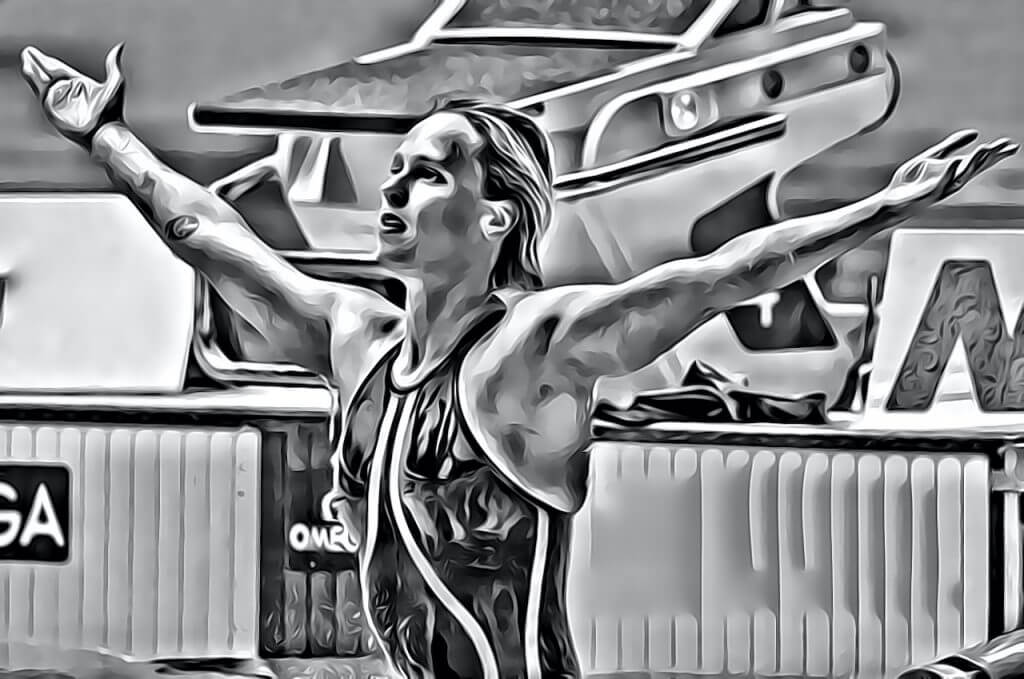
What would have unfolded had Tokyo 2020 gone ahead as planned this week – and where would it all have fit in the thread of Olympic swim legends and pioneers like Federica Pellegrini, Dawn Fraser, Shirley Babashoff, Sippy Woodhead, Shane Gould and Franziska Van Almsick?
To mark the eight days over which the Tokyo 2020 Olympic Games would have unfolded had the coronavirus pandemic not forced postponement, the team at Swimming World is filling the void with a Virtual Vision Form Guide and League of Olympic Swimming Legends.
Day 3, event 2 – make way for the queen of 200m freestyle …
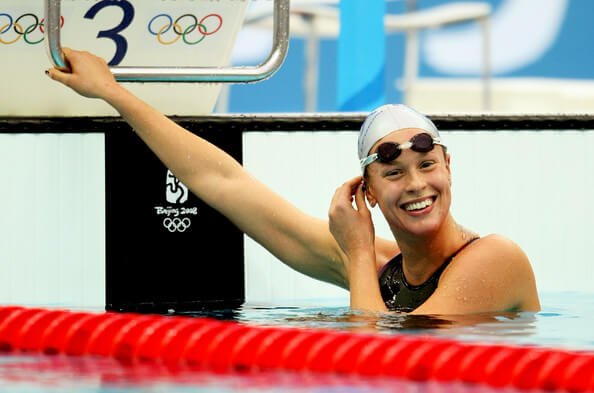
Federica Pellegrini – Photo Courtesy: Reuters / Swimming World Archive
Women’s 200m Freestyle
The Podium
- Federica Pellegrini (ITA)
- Dawn Fraser (AUS)
- Shirley Babashoff (USA)
The Other Finalists (Listed Alphabetically):
- Shane Gould (AUS)
- Debbie Meyer (USA)
- Allison Schmitt (USA)
- Franziska van Almsick (GER)
- Sippy Woodhead (USA)
- Our Lane 9* place goes to the 1984 winner, who pipped a teammate no longer at her best, and then returned four years on to finish 4th by 0.03sec behind one of two East Germans who made the podium boosted by State Plan 14:25 systematic doping:
- Mary Wayte (USA)
* – in our series, we will use Lane 9 to add an athlete whose story reflects extraordinary situations of different kinds, including being deprived by doping or political decisions or, indeed the program, as well as simple facts such as “he/she was the only other title winner who claimed gold in a WR but didn’t make out top 8 on points”
All-Time Battle Of Olympic Swim Legends Goes To Federica Pellegrini
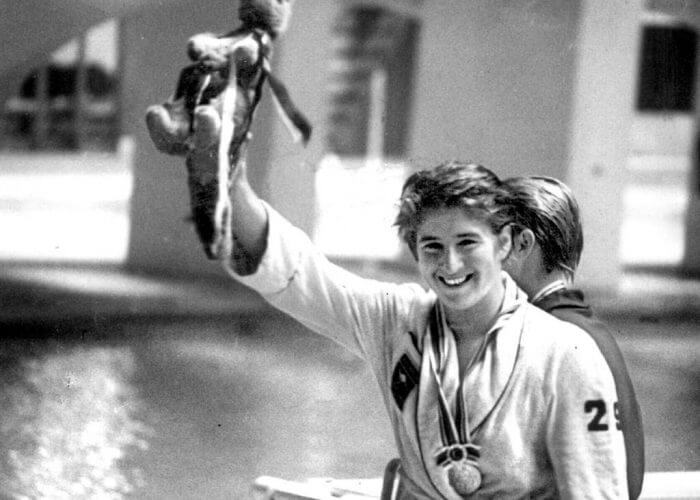
Dawn Fraser – Photo Courtesy: Dawn Fraser Collection
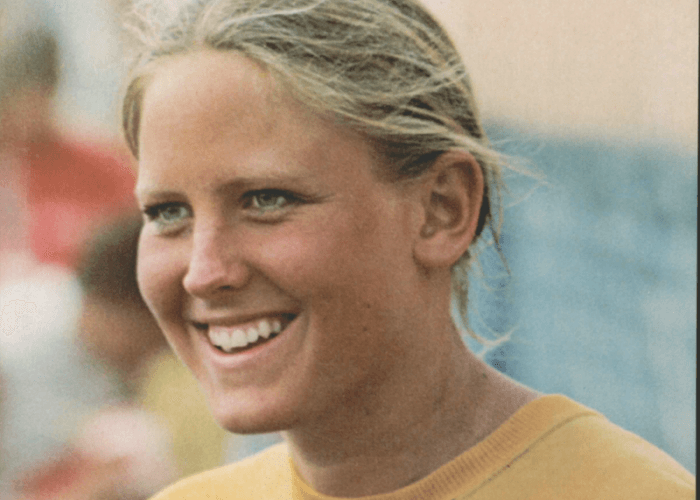
Shirley Babashoff – Photo Courtesy: Swimming World Magazine
With four appearances in an Olympic 200 freestyle final, those showings punctuated by gold in 2008 and silver in 2004, Italy’s Federica Pellegrini emerges on top of another stacked field. A medalist at eight consecutive World Championships, Pellegrini won her Olympic gold in world-record time and remains a threat for the top position heading into next year’s Games.
As impressive, she has set six world records, and has held the world standard for 12 consecutive years. Among her goals was to be “the queen of 200m freestyle”. On the scale of decoration and longevity, none come close in a event that has never seen the Olympic title retained since battle began in 1968.
Securing the silver medal is Aussie great Dawn Fraser, who actually did not get to contest the 200 freestyle in Olympic waters, the event only added to the program in 1968 at a Games Fraser was barred from racing at. During her run of three straight 100 freestyle gold medals, the 200 free was not on the Olympic schedule. Had it been on the agenda, Fraser’s medal count would undoubtedly be higher. She set four world records in the event and owned the mark from 1958-1966.
The bronze medal came down to a duel between American stars Shirley Babashoff and Cynthia ‘Sippy’ Woodhead, each woman’s career hampered by factors out of her control. Babashoff, who edged Woodhead for the last place on the podium, was the Olympic silver medalist in the 200 freestyle in 1972 and 1976, the latter runnerup finish to East Germany’s Kornelia Ender, who was part of her nation’s systematic-doping program. As for Woodhead, a three-time world-record setter and 1978 world champ, she was at her peak when the United States boycotted the 1980 Olympics.
Although she qualified for the 1984 Games and won silver in the 200 free, she was no longer a dominant force, her spirit broken, with consequence for her health and the motivation of a swimmer whose athletic trajectory was blown off course not by the doping of others that buffeted so many careers and lives but by a political decision that ended up having no discernible impact on the target of protest but robbed Olympic athletes of chance, status and mental well-being in ways that spilled out into the rest of their lives for many of those concerned, even some who made it back and claimed gold in 1984.
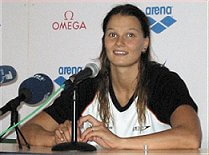
Franziska Van Almsick
Just off the podium in a line with Woodhead and a fingernail away from Babashoff were Germany’s Franziska van Almsick, twice an Olympic silver medalist who held the world record for 13 years – and was denied in 1996 by a swimmer who would test positive for a banned steroid later in her career – and Aussie teen sensation Shane Gould, whose 1972 Olympic title was followed by early retirement (see below).
The shooting-star nature of Gould’s sensational rise to an achievement never matched by another woman since – five Olympic medals in solo events at one Games – does not find favour with out event-by-event scoring but at the end of the week.
Still, expect Gould to shine on the all-time podium of our greatest legends on freestyle as we look at careers as a whole to conclude our celebration of swimming history in the week that would have witnessed the Tokyo 2020 Olympic Games had it not been for a pandemic that changed all goals and plans and schedules.
Federica Pellegrini Talks Us Through Her Olympic Victory
(In Italian… but a filk worth watching for the slo-mo breakdown and bottling of the emotional energy in the mix)
Olympic Swim Legends – Our Winner’s Winning Ways:
Federica Pellegrini – Alchemy of Silver At 16 To Gold At 20
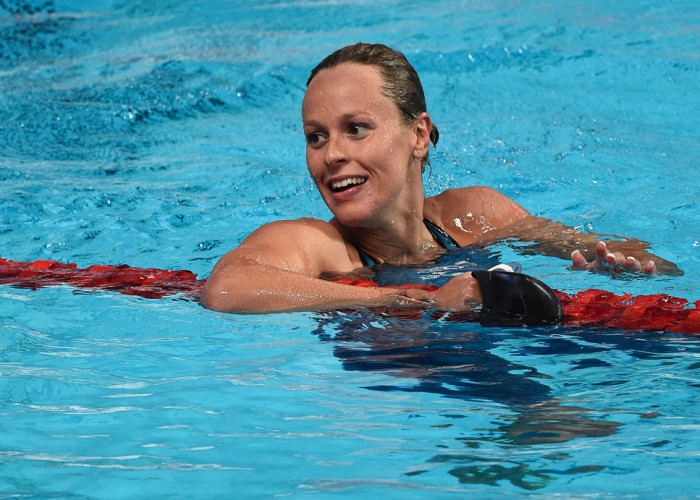
Federica Pellegrini – Photo Courtesy: R-Sport / MIA Rossiya Segodnya
2008 Beijing – Women’s 200m freestyle: Athletes: 46; Nations: 37
- 1:54..82wr Federica Pellegrini ITA
- 1:54.97 Sara Isakovic SLO
- 1:55.05 Pang Jiaying CHN
- 1:55.78 Katie Hoff USA
- 1:56.87 Camelia Potec ROM
- 1:57.65 Caitlin McClatchey GBR
- 1:57.83 Bronte Barrett AUS
- 1:57.83 Ophélie Etienne FRA
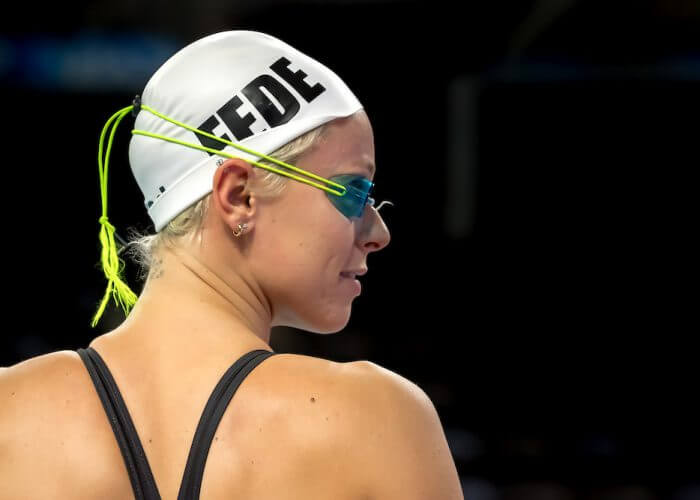
Federica Pellegrini; Photo Courtesy: Andrea Staccioli / Insidefoto / Deepbluemedia
Federica Pellegrini (ITA) learned her lesson well at the Beijing Games. She had made the mistake of going out too slow in the 400m freestyle final and then finding herself unable to respond to the pace of those ahead of her with just as much stamina: Rebecca Adlington, Katie Hoff and Joanne Jackson made the podium on 4:03s; the Italian World record holder finished fifth 1.34 sec from golf and 3.03sec away from her global high bar.
In her semi of the 200m, she practiced what she intended to convert to gold, setting the pace and establishing a World record of 1:55.45 to stamp in decisive fashion her ticket to lane 4 for the showdown.
The record had stood to Laure Manaudou, who a year before at 2007 World Championships looked a sure-fire bet for gold over 200 and 400m freestyle at Beijing 2008 four years on from 400m gold at Athens 2004. Love and the experience of youth took over and it was not to be. Pellegrini was her arch rival in European waters (and the two knew rivalry in love, too, both having dated Italian medley swimmer Luca Marin). Manaudou’s mark from 2007 had stood at 1:55.52. The old and new pace:
- 27.81; 57.04; 1:26.53; 1:55.45: Pellegrini, Beijing 2008
- 27.13; 56.24; 1:25.69; 1:55.52 – Manaudou, Melbourne 2007
Federica Pellegrini then attacked the 200m final as though she’d been launched from Vesuvius. Out in 55.92, 1.12sec inside world-record pace, she kept up the pressure on the third length as Sara Isakovic (SLO), Katie Hoff (USA) and Jiaying Pang (CHN) made their move. Out of the last turn, the Italian sensed that Isakovic was coming back at her.
Could she hang on? Determination drove the World record holder to dig yet deeper as storm clouds loomed. With each stroke in the last 5m of battle, Isakovic inched closer to a match but Pellegrini got her had to the wall in a new global standard, and first sub-155: 1:54.82. Isakovic followed her inside the 1:55 barrier, Pang just beyond it, Hoff locked out.
The Italian sun came out: Pellegrini had become the first woman from her country to lift Olympic gold.
Pellegrini swam in two suits, a training number below a Jaked racer that was yet to turn 100% non-textile. The first season of many hearty hints about what the absence of textile would mean to swimming also served to sink the GDR era deeper into history. In heats: the first to get inside Heike Friedrich’s 1:57.65 from 1988 was Pang, on 1:57.37, just shy of doping-shamed Lu Bin’s Chinese record; and then Isakovic, on a sharp 1:55.86 before Pellegrini’s World record. Isakovic, 20, had a best time of 1:58.19 at the turn of Olympic year 2008 (and her suit in the final was Arena’s almost 100% textile number that year), Pang’s best early 2008 had been a 1:58.34 before the advent of the Speedo LZR.
Rival manufacturers responded in 2009 – and one year on in Rome, Pellegrini, in 100% non-textile, took the World title in 1:52.98. And there it has stayed ever since.
The Straight Race – Beijing 2008 – Federica Pellegrini – Gold In 1:54.82 World Record
Beijing 2008 semi For Federica Pellegrini – worth listening to the Rai Sports team talk us through the swimmer’s passage to a World record as if they’re chewing the cud over a coffee, the tone
Another great 200m freestyle race In History
When Gould and Babashoff raced to Gold & Silver In Lanes 2 and 1
1972 Munich – Women’s 200m freestyle – Athletes: 32; Nations 17
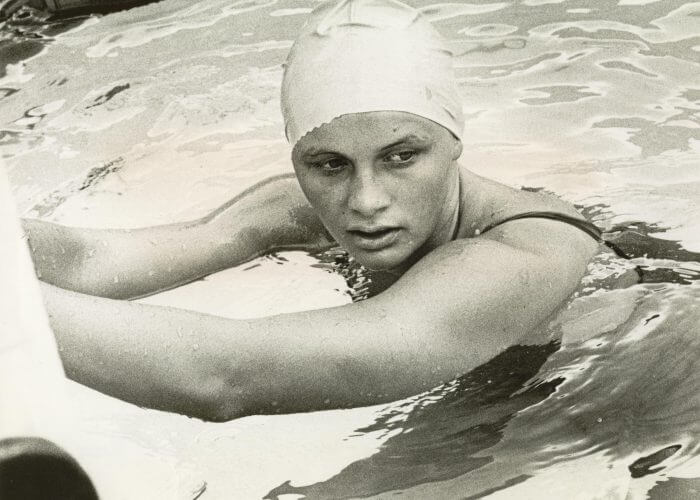
Shane Gould – Photo Courtesy: Kevin Berry/Swimming World Archive
Shirley Babashoff had taken the World record from Shane Gould at U.S. Olympic trials in Chicago on August 14: down from 2:05.8 to 2:05.21, the first global mark in the event registered to the 100th. Gould’s effort dated back to November 1971, though, and ion the days when swimmers from across the world did not get to race each other on a regular basis, all that was known as Gould took to her blocks for the final of the 200m was that she was in sizzling form, gold in the 200m medley, bronze in the 100m freestyle and then gold in the 400m freestyle, all on consecutive days, behind her, the 800m freestyle yet to come.
In the 200m heats, neither Gould nor Babashoff gave a hint of the speed to come: Ann Marshall (USA) set the pace at 2:08.12 in the first heat; Keena Rothhammer (USA) took the 2nd heat in 2:07.48 and the GDR’s Andrea Life the third in 2:07.05. That left the previous and new World record holders out in lanes 2 and 1 respectively.
In the final, Gould let from gun to gold: out in 29.23 and made the 100m mark on 1:00.04 (a time that would have won a 100m medal at any previous Olympics in history, including 1968 gold if you take away the 100th that was there for the first time; and was actually being counted to the 1000th for the first and last time).
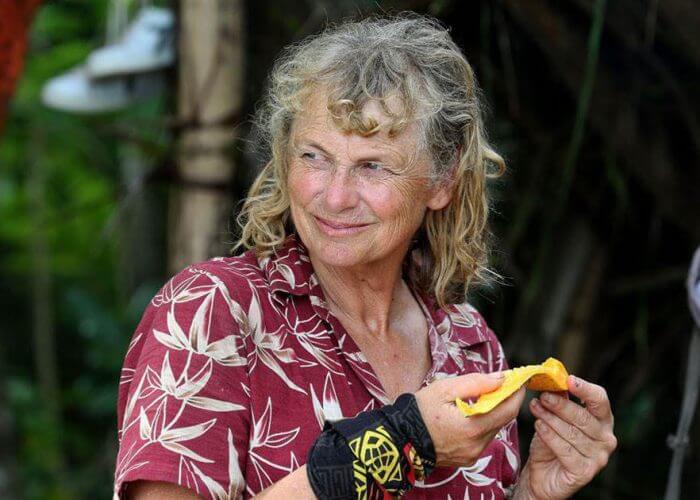
Shane Gould, the strategist worked out how to survive and become the oldest winner of Survivor anywhere in the world – Photo Courtesy: Survivor, Channel 10, Shane Gould
Her outgoing speed was part of the instinctive feel for water, for racing, for the mood music around her: she was 15 but would tap into those natural and then honed abilities throughout life.
At half-way in the Munich 200m final, the three American opponents who had worn “All That Glitters Is Not Gould” T-Shirts to the party only to find Gould apparently untroubled by it all, having taken a nail-file to the Call Room with her so she could sit and hone her talons without being distracted by events around her, turned in 1:01.41, 1:01.44 and 1:01.45, the splits belonging respectively to Rothhammer, Babashoff and Marshall.
By the last turn, Gould maintained a strong lead, on 1:32.29, Rothhammer and Babashoff breaking free of Marshall as they narrowed the gap to the pace-setter, on 1:33.29, 1:33.30 respectively. Babashoff closed the gap a fraction more on the last length but Gould’s sharpened nails stopped the clock on 2:03.56, a new World record, victory sealed by a comfortable margin over Babashoff’s American record of 2:04.33 and Rotthammer’s 2:04.92 warm-up for gold ahead of Gould’s silver in the 800m to come.
The Australian’s tally of five solo medals, three gold, one of each of the other colours, remains a single Games record to this day. At 16, she retired, not, as often written, because she was fed up with the “sacrifices” of being a champion swimmer but because she was uneasy with giving up her identity and life energy to those who would manage and direct her in ways she was not prepared to allow. A new adventure was calling.
The 1972 Olympic 200m freestyle final comes at the end of this archive film from Argentina:



